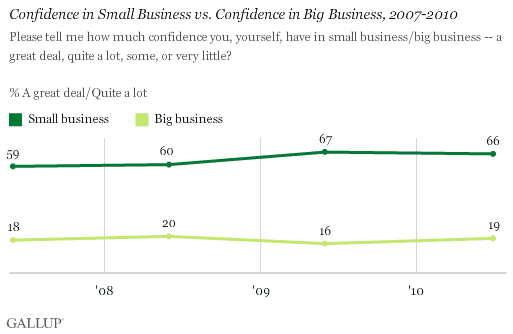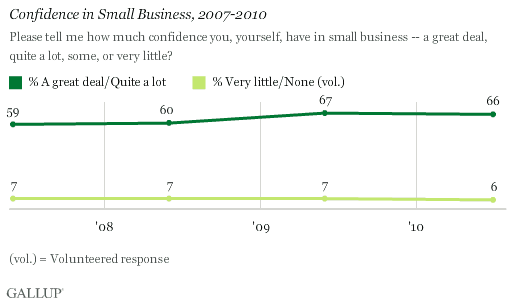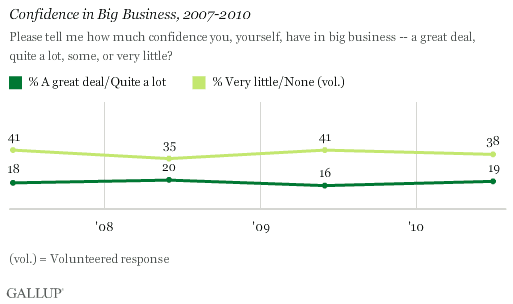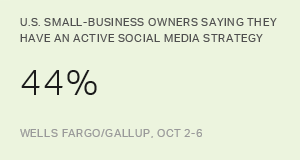PRINCETON, NJ -- During the ups and downs of this U.S. recession, Americans' faith in small business has grown, while their faith in big business has not. Three times more Americans now say they have "a great deal" or "quite a lot" of confidence in small business (66%) than say this about big business (19%). And this gap has grown since the global financial collapse.

The high level of confidence Americans have in small business gives it a second-place ranking among the 16 institutions rated this year, while big business ties for second to last with HMOs.
Confidence in Small Business Stays High
Americans' current confidence in small business is essentially unchanged from last year's level, though it is up from the pre-financial-crisis days of June 2007 and June 2008.

Gallup first asked about confidence in small business in 1997, and has done so every year since 2007. Confidence was highest last year, at 67%, and has never been lower than 57%. Six percent of Americans express "very little" or "no" confidence in small business -- essentially unchanged since the pre-recession days of 2007.
Confidence in Big Business Little Improved From 2009 Low
At 19%, Americans' confidence in big business is up slightly from last year's record low of 16%; still, big business outperforms only Congress in this year's rankings. Similarly, the 38% saying they have very little or no faith in big business is down slightly from last year, but trails only Congress, at 50%.

Gallup trends suggest that Americans have never shown much confidence in big business. Since the 1930s, many Americans have held a certain degree of skepticism about the market power wielded by big companies -- the basis of many antitrust laws. In turn, this has made those companies easy political villains. Confidence in big business peaked in 1975, at 34%, up from 26% in the initial confidence survey in 1973.
Far more Americans today are not confident than are confident in big business: 38% express very little or no confidence, slightly improved from a year ago (41%). Since 2007, nearly twice as many Americans have expressed very little or no confidence in big business as opposed to a great deal or quite a lot of confidence.
Leveraging Americans' Confidence in Small Business
It is not surprising that so many Americans have more confidence in small business than in big business. People often know the small business owners in their communities as friends and neighbors. Rightly or wrongly, big businesses are often perceived as distant and having little or no interest in the many local communities they serve. These negative perceptions of big business have been exacerbated by globalization and the failure and then bailout of big businesses during the past couple of years.
Right now, Congress has before it a new legislative effort to help small businesses get credit and expand in the current economic environment. In part, this may reflect a general recognition that small businesses drive U.S. job growth and, thus, that the government needs to find ways to encourage them to expand. Another reason may relate to the political appeal of Gallup's findings that Americans across gender, age, income, and ideology categories have much more confidence in small businesses.
Despite Americans' ongoing support, America's small businesses continue to struggle in the current economic environment. While government might try to help, the best thing it could do to help small businesses deliver might simply be to get the overall U.S. economy growing more rapidly.
Results for this Gallup poll are based on telephone interviews conducted July 8-11, 2010, with a random sample of 1,020 adults, aged 18 and older, living in the continental U.S., selected using random-digit-dial sampling.
For results based on the total sample of national adults, one can say with 95% confidence that the maximum margin of sampling error is ±4 percentage points.
Interviews are conducted with respondents on landline telephones (for respondents with a landline telephone) and cellular phones (for respondents who are cell phone-only). Each sample includes a minimum quota of 150 cell phone-only respondents and 850 landline respondents, with additional minimum quotas among landline respondents for gender within region. Landline respondents are chosen at random within each household on the basis of which member had the most recent birthday.
Samples are weighted by gender, age, race, education, region, and phone lines. Demographic weighting targets are based on the March 2009 Current Population Survey figures for the aged 18 and older non-institutionalized population living in continental U.S. telephone households. All reported margins of sampling error include the computed design effects for weighting and sample design.
In addition to sampling error, question wording and practical difficulties in conducting surveys can introduce error or bias into the findings of public opinion polls.
For more details on Gallup's polling methodology, visit https://www.gallup.com/.
